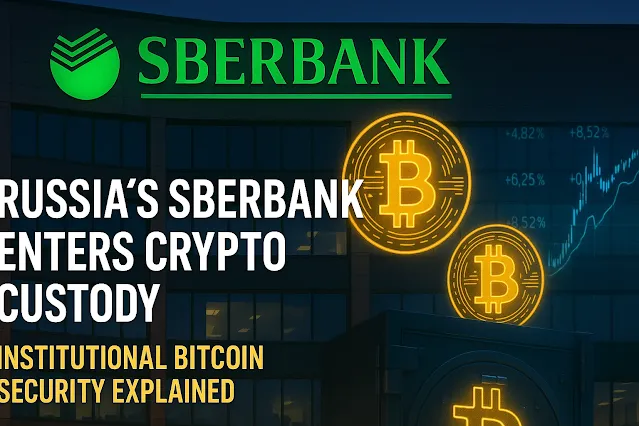Introduction
Russia’s financial
world is buzzing. Imagine Sberbank—the nation’s largest state‑owned
bank—stepping boldly into the crypto sphere. Just this week, the lender
unveiled plans to roll out custody services for cryptocurrencies. This
isn’t just about safekeeping wallets; it’s a strategic play in Russia’s broader
effort to institutionalize digital assets and circumvent Western
sanctions. Let’s unpack what this means for Bitcoin, banks, and Russia’s
digital future.
What Is Crypto Custody?
- Crypto custody refers to the secure storage of digital assets like Bitcoin and Ethereum, typically by a trusted third party, such as private keys stored in hardware or secure vaults.
- Traditionally,
banks haven’t been in the custody game due to unclear regulations and
hacking risks. Clients relied mostly on private firms like Coinbase or
BitGo, and even major exchanges faced high‑profile breaches.
Sberbank’s Game‑Changing Announcement
Happening on July 17, 2025, Sberbank said they would start offering custody for Russian cryptocurrency assets, aiming to regulate them like traditional bank accounts.
Key takeaways:
- Bank‑grade
safeguards: Sberbank plans bank‑level storage, potentially even
freezing assets tied to investigations.
- Legislative
push: They’ve formally requested central bank backing to treat crypto
as regulated assets.
- Institutional
appeal: Insight Finance experts say custodians are the “backbone” of
crypto markets private firms dominate today, but local banks might shift
the power Reuters.
Why Now? The Sanctions Context
Russia’s move isn’t accidental. Following the 2022 invasion,
Western sanctions hit hard. Russia responded by:
- Legalizing
crypto‑mining and cross‑border crypto payments
- Launching
a digital ruble CBDC pilot.
- Rolling
out crypto‑linked bonds, including Bitcoin‑tied debt instruments (Nasdaq).
This all fits a broader narrative: escape the SWIFT
chokehold and give sanctioned businesses an alternative finance tool.
How Custody Raises the Stakes
- Institutional
trust: Big players—banks, funds, insurers—lean toward regulated
custodians over private tech providers.
- Security
terror reduced: Hackers and rug‑pulls aside, clients feel safer when
their assets are protected by a bank with liability insurance.
- Compliance
control: On‑chain crime? Sberbank can freeze assets if red flags are
spotted.
- Link
in the pipeline: This custody system complements crypto‑bonds,
futures, and the digital ruble in a unified national strategy.
Potential Pitfalls and Criticisms
No masterpiece is flawless. Some concerns:
- Regulatory
complexity: Integrating crypto into banking frameworks requires
clarity. Sberbank itself asked for central‑bank certainty.
- Sanctions
might bite back: Western regulators could blacklist Sberbank’s custody
arm if it’s used to evade sanctions.
- Liquidity
challenge: Even if Russian firms want to settle in crypto,
counterparties abroad, especially under pressure, might avoid such deals.
What This Means for Bitcoin and the Global Crypto
Market
- Mainstream
appeal escalates: Banks entering custody supports Bitcoin and major
tokens’ credibility.
- FX-parity
exposure: Combined with the ruble digital and BTC bonds, clients gain
sophisticated tools to hedge ruble volatility.
- New
corridors emerge: Institutional custody may open doors for crypto in
trade partnerships, especially with nations like China and India, reluctant to use fiat channels.
Grab the Headlines—Top Quotes & Insights
- Anatoly
Pronin, Sberbank exec: “Crypto assets should be regulated like bank‑account
assets… we want to guarantee token safety”.
- Gleb
Zemskoy, Insight Finance: “No fund or crypto user could do without
custody services… backbone of the world economy”.
- Key
fact: Russia’s crypto‑mining output climbed to #2 globally, generating
~$3.5 billion in Bitcoin value in 2023.
Conclusion
Sberbank’s crypto custody launch is more than a cry for
innovation—it’s a geopolitical statement. Anchored in financial might and
regulatory muscle, it signals that Russia wants a seat at the global crypto
table. But the real question remains: Will international institutions
follow? Or will sanctions continue to isolate?
Whether you're a Bitcoin investor, crypto journalist, or
financial analyst, this is a trend worth tracking.


